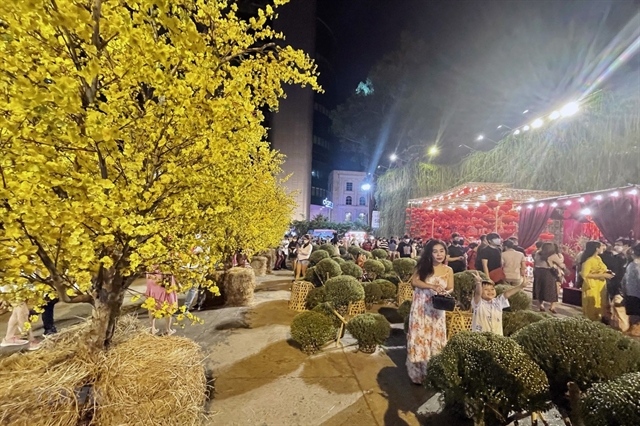
HÀ NỘI — Cities and provinces are applying their own varying COVID-19 travel regulations, leaving people planning to visit their hometowns for Tết puzzled.
Although the Ministry of Health has sent an official letter requesting localities to rectify the quarantine of people returning home to celebrate Tết as regulated, many localities are still applying their own rules.
Under the Government’s Resolution 128 and the ministry’s Decision 4800, only passengers from locked-down areas or red zones (extremely high risk) are required to quarantine at centralised facilities or self-quarantine at home.
Given that most people are fully vaccinated and many have got booster jabs, social knowledge about COVID-19 prevention has been improved and the health system’s capacity to prevent the pandemic is much better than before, many people hoped that localities would create convenient conditions for them to go home to celebrate Tết.
However, each locality has announced its own rules. Most have applied mandatory quarantine for people from red zones and orange zones (very high-risk areas) for at least seven days and self-monitor their health for seven more days, regardless of their health condition.
For those who are not fully vaccinated, the period quarantine will increase to 14 days.
This means people returning home for Tết will not be allowed to leave their house. Some will might even have to spend the holiday in local centralised quarantine sites.
COVID-19 testing is compulsory during their quarantine period. Some localities have encouraged people to take COVID-19 testing before entering the localities.
Local residents are encouraged not to move out of their locality. Those who go out of the locality must take COVID-19 testing before going back.
In northern Quảng Ninh Province, centralised quarantine is mandatory for people from red and orange zones. Fully jabbed people must stay for seven days and get tested twice before self-monitoring their health at home for a further seven days.
Those who are not vaccinated must spend two weeks at the centralised quarantine site and will be released after testing negative three times.
In northern Thái Bình Province, the same quarantine will be applied for those from red and orange zones. They will be tested on the first day and seventh day of arrival.
Since January 15, people entering the northern Tuyên Quang Province be tested for COVID-19 and report the results to local authorities. If the results are positive, they must isolate as regulated. Healthy people are required to self-monitor their health at home for seven days.
Hải Phòng City has requested passengers from both red and orange zones to home-quarantine for one week if they’re fully vaccinated, or two weeks if they are young or elderly.
The same regulations have been applied in northern Bắc Ninh Province.
Both northern mountainous provinces of Lạng Sơn and Lào Cai have asked people from red and orange zones to take a COVID-19 test on the first day of arrival. Those who are not fully vaccinated will be required to take rapid and RT-PCR tests on the first, seventh and 14th day depending on their quarantine period.
In Hưng Yên Province, people travelling to Hà Nội must sign a commitment to limit contact with other people when returning to the province.
Officials and workers going on business trips outside the province must get approval from their leaders and test negative 72 hours before returning to work.
Labourers working in enterprises must be approved by their business owners to get out of the province and must self-quarantine for 14 days before returning to work.
The authorities of Phú Thọ, Ninh Bình, Nam Định and Vĩnh Phúc provinces have required people to get tested before arrival. Those entering northern Hà Nam Province and not from red zones are only required to make health declaration.
Thái Nguyên is among localities that have advised people not to return for Tết. The province requires COVID-19 testing for those who want to enter the province.
The central provinces of Nghệ An and Hà Tĩnh have applied self-monitoring measures for those from orange zones, as well as tests on the first and seventh day after their arrival.
People from orange zones must have a negative test within 72 hours to enter central Quảng Bình Province and must self-quarantine for 14 days if they have not been vaccinated twice.
People entering the country, except for children under 2 years old, must test negative for COVID-19 by PCR method within 72 hours before entry.
Incoming people who are Vietnamese citizens or overseas Vietnamese will be able to receive a free vaccine during their isolation period if they have not received it already.
In Đà Nẵng City, people from red and orange zones will have to self-quarantine and self-monitor for 14 days.
The southern province of Bà Rịa-Vũng Tàu people must self-monitor their health for seven to 14 days, depending on their vaccination status.
Trà Vinh Province has required 14-day quarantine for those from red zones and not vaccinated. Others will self-monitor at home for seven days. — VnExpress News
- Reduce Hair Loss with PURA D’OR Gold Label Shampoo
- Castor Oil Has Made a “Huge” Difference With Hair and Brow Growth
- Excessive hair loss in men: Signs of illness that cannot be subjective
- Dịch Vụ SEO Website ở Los Angeles, CA: đưa trang web doanh nghiệp bạn lên top Google
- Nails Salon Sierra Madre
 VnExpress News The News Gateway of Vietnam
VnExpress News The News Gateway of Vietnam





